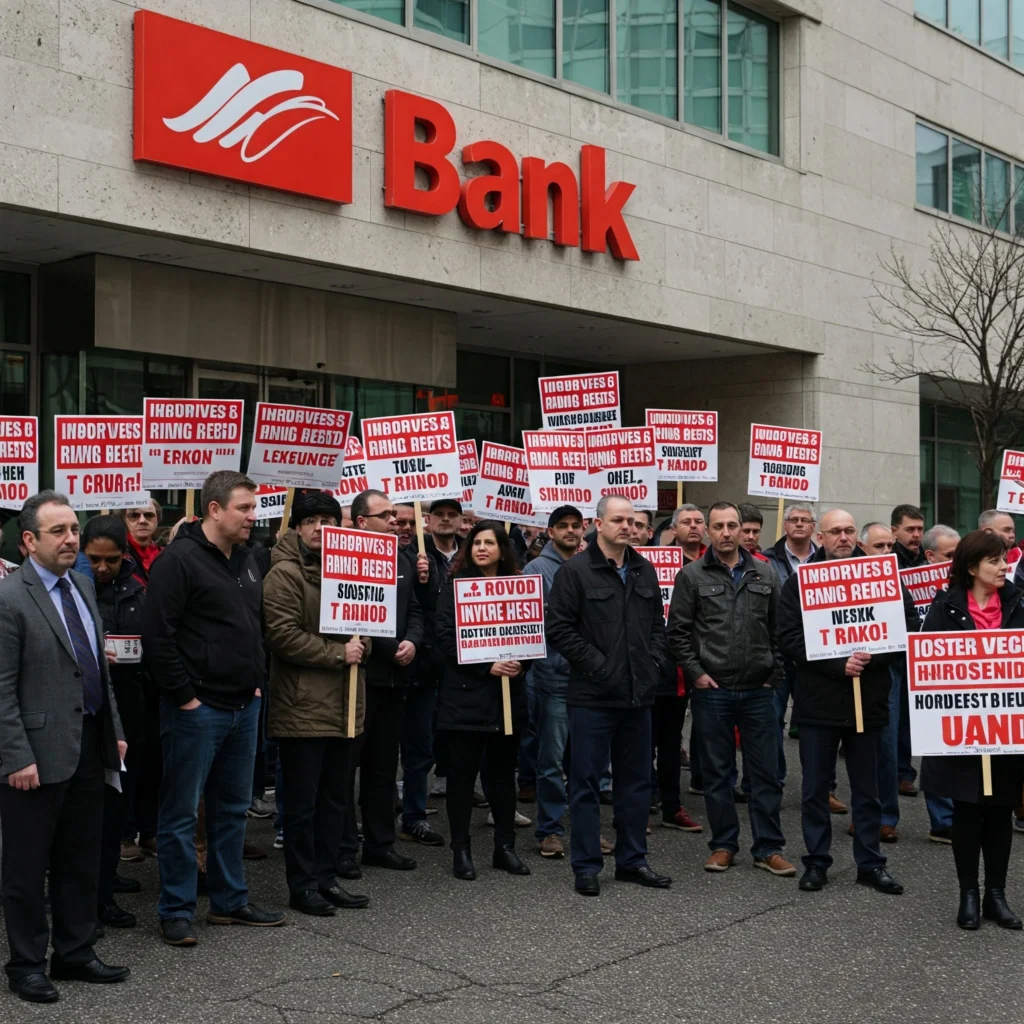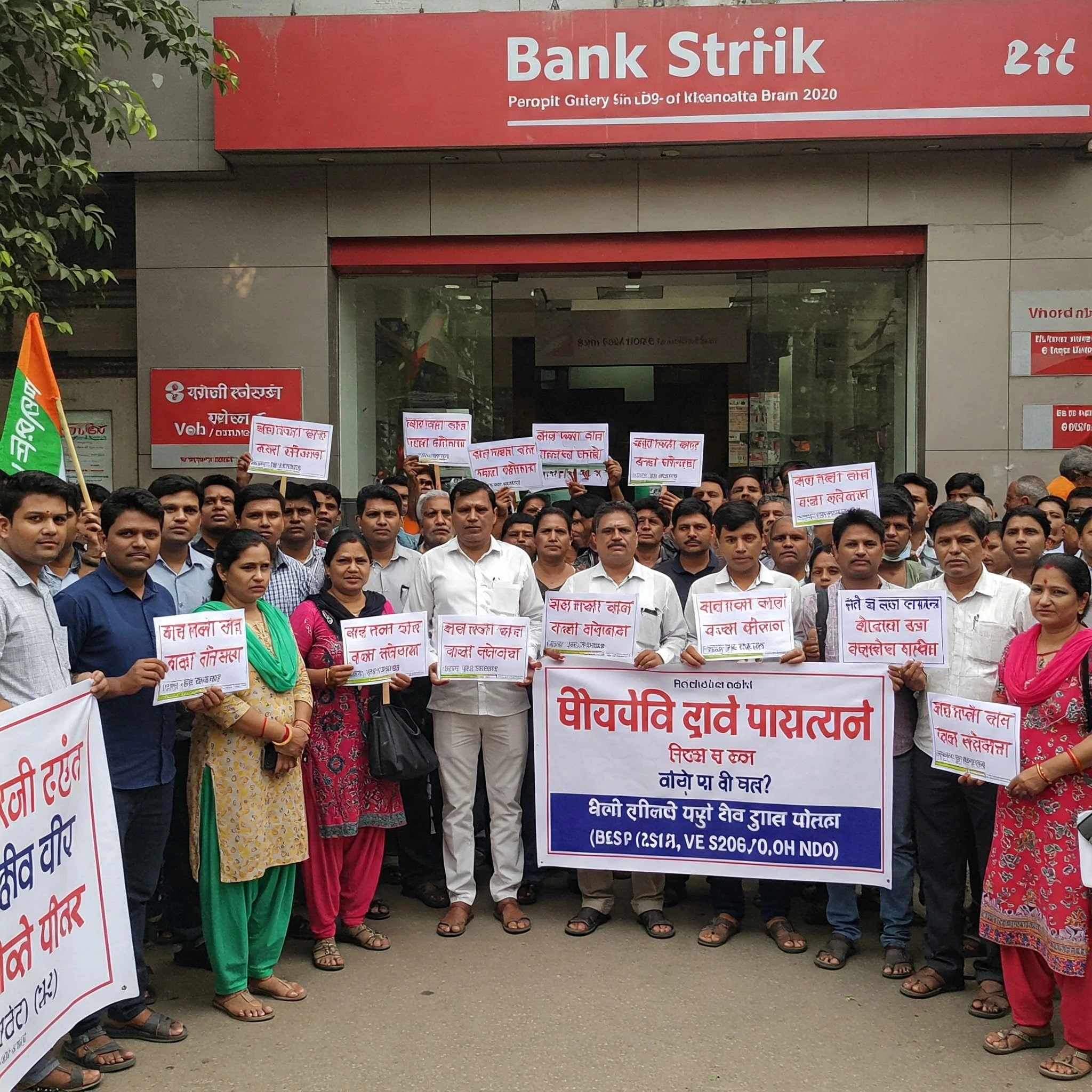Table of Contents
📌 Introduction
In a major relief for banking customers, the United Forum of Bank Unions (UFBU) has postponed the planned two-day nationwide strike set for March 24-25, 2025, following productive talks with the Indian Banks’ Association and government, ensuring seamless banking services.
📜 Background of the Proposed Strike
The United Forum of Bank Unions (UFBU), representing nine major bank unions, called for a two-day nationwide bank unions strike scheduled for March 24–25, 2025. The move came after prolonged dissatisfaction over unresolved issues affecting bank employees. Key demands included the implementation of a five-day workweek—similar to what institutions like the RBI follow—along with immediate recruitment to address widespread staff shortages. The unions also emphasized the need for regularizing contractual staff, many of whom face job insecurity and lack proper benefits.
Another pressing concern was the lack of adequate protection for bank employees, especially with rising incidents of workplace aggression. Additionally, the unions raised objections to new directives from the Department of Financial Services (DFS) involving performance reviews and performance-linked incentives, which they felt undermined employee morale and violated prior agreements.
Cumulatively, these unresolved issues led the unions to believe that industrial action was the only way to draw attention to their grievances. The strike was strategically timed after a weekend, threatening a potential four-day shutdown of banking services across the country. This backdrop highlighted growing unrest in the sector and the urgency for authorities to address long-standing labor concerns.
📋 Key Demands Raised by Bank Unions

1. Transition to a Five-Day Workweek
Bank employees have long advocated for a five-day workweek, aligning with practices in institutions like the Reserve Bank of India (RBI) and other governmental bodies. They believe this change would promote better work-life balance, reduce burnout, and increase overall productivity. The unions argue that a five-day workweek would not only benefit employees but also enhance customer service by allowing staff to be more focused and efficient during working hours.
2. Comprehensive Recruitment Initiatives
Addressing the growing workload and staff shortages, the unions called for recruitment at all levels to ensure efficient banking operations and improved customer service. They highlighted that many bank branches are operating with minimal staff, leading to increased pressure on existing employees and longer wait times for customers. The unions emphasized the need for a strategic recruitment plan to fill existing vacancies and prepare for future retirements.
3. Assurance of Job Security for Contractual Employees
A significant number of bank employees are engaged on temporary or contractual terms, leading to job insecurity. The unions demanded the regularization of these positions to provide financial stability to the affected employees. They argued that offering permanent positions would not only improve morale but also enhance the quality of service, as employees would be more invested in their roles.
4. Implementation of Enhanced Employee Protection Measures
With increasing instances of workplace challenges, including verbal and physical abuse from customers, the unions emphasized the need for stronger security measures to safeguard bank employees, especially during periods of financial instability. They proposed the installation of security systems, hiring of security personnel, and the establishment of clear protocols to handle aggressive behavior, ensuring a safe working environment for all staff members.
⚠️ Potential Impact of the Strike on Banking Services
Had the strike proceeded, it was expected to cause considerable disruptions, including:
- Extended Bank Closures: The strike was scheduled immediately after a weekend (March 22-23, 2025), potentially leading to a four-day hiatus in banking services.
- Delays in Financial Transactions: Essential services such as cash deposits, withdrawals, cheque clearances, and loan processing could have faced significant delays.
- Increased Pressure on Digital Banking Platforms: With physical branches closed, a surge in online banking usage was anticipated, possibly resulting in slower transaction processing and technical glitches.
These disruptions would have affected not only individual customers but also businesses relying on timely financial transactions, potentially impacting the broader economy.
🤝 Resolution and Postponement of the Strike
Just days before the planned strike, a series of high-level negotiations between the UFBU, Indian Banks’ Association (IBA), and the Ministry of Finance led to the strike’s postponement. The Chief Labour Commissioner played a crucial role in mediating the dialogue. Unions agreed to defer their agitation after receiving formal assurances that their key demands would be taken up for discussion in the coming weeks.
Among the assurances was a commitment to re-evaluate the five-day workweek proposal, expedite staff recruitment, and form a working group to review the status of contractual employees. The IBA also acknowledged concerns over performance-linked incentive schemes and promised to relay the unions’ feedback to the DFS.
While no immediate solutions were implemented, the unions were encouraged by the seriousness with which the issues were addressed. A follow-up meeting was scheduled for April 22, 2025, to assess progress. The UFBU emphasized that the strike was postponed—not canceled—signaling their willingness to resume action if satisfactory progress wasn’t made.
The decision ensured continuity of banking operations and provided breathing space for both sides to work toward a lasting resolution, preventing disruptions that could have affected millions of customers and the broader economy.
📣 Responses from Various Stakeholders
- Banking Institutions: Financial institutions welcomed the postponement, expressing commitment to engaging in constructive dialogues to address employee concerns.
- Customers: Bank customers across the country expressed relief, as the postponement ensured uninterrupted access to banking services.
- Financial Analysts: Experts highlighted the importance of effective communication and negotiation in resolving industrial disputes without disrupting essential services.
🔮 Implications for Investors and the Banking Sector

The postponement of the bank strike had a positive short-term impact on investor sentiment and financial market stability. A successful resolution signaled institutional maturity, showing that disputes could be resolved through negotiation rather than disruption. This was particularly reassuring for investors watching India’s banking sector, as it averted a potential four-day shutdown that could have affected transaction volumes, customer confidence, and economic activity.
From a macroeconomic standpoint, the move maintained the continuity of financial services, critical to sectors like trade, retail, and industry. It also highlighted the government’s responsiveness to labor concerns, reflecting a balanced approach between economic growth and worker welfare.
For long-term investors, the development helped reduce perceived risk associated with investing in public sector banks. With labor relations appearing manageable and negotiations ongoing, investors are likely to view India’s banking landscape as more stable and investment-worthy. Furthermore, the issues raised—such as staffing gaps, employee welfare, and privatization—are now at the forefront of policy discussions, potentially paving the way for reforms that could enhance operational efficiency and governance in the sector.
Overall, the resolution reassured stakeholders of systemic stability and the resilience of India’s financial institutions amidst evolving labor dynamics.
📊 Comparative Overview
| Aspect | Prior to Negotiations | Post-Negotiations |
|---|---|---|
| Workweek Structure | Six-day workweek | Discussions on five-day week ongoing |
| Recruitment | Notable staff shortages | Commitment to address recruitment needs |
| Job Security for Contractual Staff | Prevalent job insecurity | Assurance to review and improve job stability |
| Employee Protection Measures | Concerns over safety | Plans to implement enhanced security protocols |
| Customer Service Impact | Potential service disruptions | Continuation of uninterrupted services |
🛡️ Opposition to DFS Directives and Micromanagement
The UFBU has voiced strong opposition to recent directives from the Department of Financial Services (DFS), particularly concerning performance reviews and performance-linked incentives. Unions argue that these measures threaten job security, foster division among employees, and violate the 8th Joint Note. Moreover, the UFBU criticizes what it perceives as “micromanagement” by the DFS, asserting that such interference undermines the autonomy of public sector bank boards and affects operational efficiency.
💼 Demand for Filling Vacant Positions and Enhancing Representation
A significant concern raised by the UFBU is the numerous vacant positions in public sector banks, especially at the workmen and officer director levels. The unions emphasize that filling these roles is crucial for adequate employee representation in decision-making processes. They argue that the absence of appointed directors hampers the effective functioning of bank boards and neglects the voices of the workforce.
🏛️ Call for Amendments to the Gratuity Act
The United Forum of Bank Unions (UFBU) has strongly advocated for significant amendments to the Gratuity Act, primarily calling for the ceiling to be raised from the current ₹20 lakh to ₹25 lakh. This proposed revision aims to align bank employee benefits with those enjoyed by central government staff.
The UFBU also seeks complete income tax exemption on gratuity payouts, arguing that such benefits would provide much-needed financial relief to retiring employees who have served the sector for decades. Beyond monetary support, the unions believe these amendments would recognize the long-standing contribution of bank employees to India’s economic growth. The current tax obligations and capped limits are seen as outdated and inadequate in today’s inflationary environment.
Furthermore, with the cost of living rising and retirement costs growing, a higher gratuity ceiling would ensure better post-retirement security and dignity for thousands of employees in the public banking sector. The UFBU continues to press the government to treat this issue with urgency, especially as similar benefits have already been extended in other government departments.
🔒 Resistance to Outsourcing and Privatization Efforts
The UFBU has consistently opposed the outsourcing of permanent jobs and the broader push for privatization of public sector banks. The unions argue that outsourcing erodes job security, reduces accountability, and threatens service quality, as outsourced roles often involve untrained or underpaid personnel.
The privatization of IDBI Bank is cited as a cautionary example, sparking fears that other banks may follow, thereby weakening the public banking system’s social commitment. UFBU leaders warn that such moves prioritize profit over people, undermining the sector’s developmental role. They firmly advocate that the government must retain at least a 51% equity stake in all public sector banks to maintain public control and safeguard the nation’s economic interests.
Privatization, according to the unions, risks transforming public institutions into corporate entities with little regard for financial inclusion or rural banking services. They emphasize that public banks have played a vital role in nation-building and should not be reduced to profit-centric models. The UFBU continues to rally public and political support to oppose any dilution of government ownership in public banks.
📝 Final Thoughts

The postponement of the planned bank strike underscores the effectiveness of dialogue and negotiation in resolving industrial disputes. As the banking sector continues to evolve, collaborative efforts between employees, unions, and authorities remain crucial in fostering a resilient and efficient financial ecosystem. This development not only ensures uninterrupted banking services for customers but also sets a positive precedent for addressing workforce concerns through constructive engagement.
❓ Frequently Asked Questions (FAQs)
1: What prompted the bank unions to consider a strike?
👉The unions aimed to address issues such as the implementation of a five-day workweek, comprehensive recruitment, job security for contractual employees, and improved protection measures for bank staff.
2: How was the strike averted?
👉Through successful negotiations facilitated by the Chief Labour Commissioner, with assurances from the IBA and the Finance Ministry to address the unions’ concerns.
3: Is there a possibility of future strikes?
👉While the current strike has been deferred, future actions will depend on the outcomes of ongoing negotiations and the fulfillment of the unions’ demands.
4: How does this development affect bank customers?
👉Customers can continue to access banking services without disruptions, as the strike has been postponed.
5: What measures are being considered to enhance employee well-being?
👉Authorities have committed to reviewing policies related to work hours, recruitment, job security, and employee protection measures.
📊 Poll: Share Your Opinion
Do you support the implementation of a five-day workweek for bank employees?
- Yes
- No
- Undecided
Let us know your answer in the comments !
📣Stay Updated with TrendingDaily24
For the latest updates on banking news, financial trends, and industry developments, follow TrendingDaily24. Stay informed about changes in the banking sector, policy updates, and more!
Bookmark TrendingDaily24 and never miss an important update!
Check out our other articles – IndusInd Bank Shares Reduced by nearly 6%
Check out our post on X –Tata Tiago EV is India’s most affordable electric hatchback

